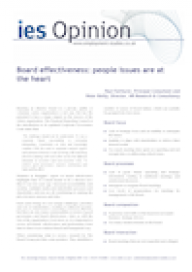Publications
 We author and publish a range of resources to keep you up to date with the latest developments in employment, labour market and human resource policy and practice.
We author and publish a range of resources to keep you up to date with the latest developments in employment, labour market and human resource policy and practice.
All our pdf publications are free to access.
-

Green skills and environmental awareness in vocational education and training
Synthesis report
May 2012 | European Centre for the Development of Vocational Training (CEDEFOP)This study on green skills and environmental awareness in vocational education and training identifies challenges, priorities and policy recommendations for taking advantage of the transition towards a green economy by facilitating labour-market responses to emerging skill needs. In particular, the study investigates the links between skill needs in the labour market and the responses of learning providers.
-

Managing Extended Working Life
Lucy D, Broughton A, Lazazzara A, Stettes O, Le Boulaire M, Tran X | May 2012 | Entreprise & PersonnelThe issue of the ageing workforce raises important questions about the balance between economic and social factors in European societies. The university of Milan Bicocca in Italy, IES in the UK, the Institut der Deutschen Wirtschaft in Cologne, and Entreprise & Personnel in France decided to throw light on how the issue of managing older workers takes shape in companies in their respective countries and what analysis can be made of those realities.
-

Slides: Reward – what next for local government and the public sector?
Louise Tibbert | May 2012 | Herts County CouncilSlides from Louise Tibbert of Herts County Council on 'Reward – what next for local government and the public sector?' which she presented at the HR Network event on the 'Role of incentives in tough times' on 17 May 2012.
-

Slides: The role of incentives in tough times
Peter Reilly | May 2012 | Institute for Employment StudiesAn introduction from Peter Reilly to the HR Network event on the 'Role of incentives in tough times' held on 17 May 2012.
-
📄
Apprenticeship supply in the Member States of the European Union
Final Report
May 2012 | European CommissionThis study is intended to provide an overview of the supply of apprenticeship-type schemes in the EU Member States. For this purpose, the study discusses the effectiveness of these schemes in raising employability and facilitating labour market transitions of apprentices in the EU. The study also provides a number of recommendations for improving the functioning and performance of this type of VET schemes.
-

Study on a comprehensive overview on traineeship arrangements in Member States
Final Synthesis Report
Hadjivassiliou K, Carta E, Higgins T, Rickard C, Ter-Minassian S (IES) Pesce F, Samek M, Barbieri D, Broglio D, Naaf S (IRS) Grollmann P, Weigel T, Wolfgarten T, Hensen K (BIBB) | Apr 2012 | European CommissionThe main objective of this study was to provide an overview of traineeship arrangements in all 27 Member States and to collect the most up-to-date information about different forms of traineeships across the EU.
-

Board effectiveness: people issues are at the heart
Fairhurst P, Reilly P | Apr 2012 | Institute for Employment StudiesRunning an effective board in a private, public or voluntary sector organisation is not easy but has the potential to have a major impact on the success of the whole organisation. Each sector brings its own unique challenges, priorities and sets of stakeholders, resulting in different agendas, but there are also many commonalities in terms of good governance and board effectiveness. This paper brings together useful insights into the possible pitfalls and challenges, and offers approaches for unleashing the potential of any organisation's board.
-

ICT for Disabled People
Apr 2012 | Houses of Parliament (Parliamentary Officeof Science & Technology)Information and Communication Technologies (ICT) underpin many aspects of modern living, so for the 10 million disabled people in the UK access to ICT is an important factor in their quality of life. This POSTnote summarises the issues that disabled people face in using ICT and looks at progress towards achieving equivalent access to services for disabled and non-disabled users.
-

Slides: SCARF threats and rewards
Sharon Varney | Apr 2012 | Institute for Employment StudiesHandouts from Sharon Varney (IES Associate) on 'SCARF threats and rewards' which she discussed at the HR Network event on 'Managing difficult change and developing your OD toolkit' on 19 April 2012.
-

Slides: Exploring self-organisation
Sharon Varney | Apr 2012 | Institute for Employment StudiesSlides from Sharon Varney (IES Associate) on 'Exploring self-organisation' which she presented at the HR Network event on 'Managing difficult change and developing your OD toolkit' on 19 April 2012,
